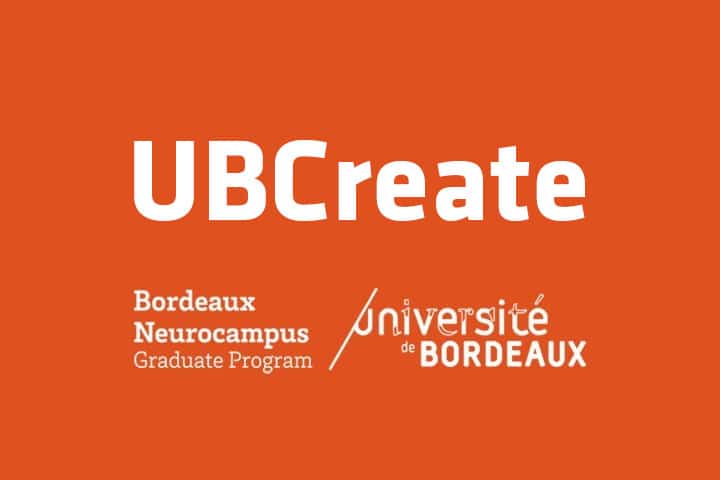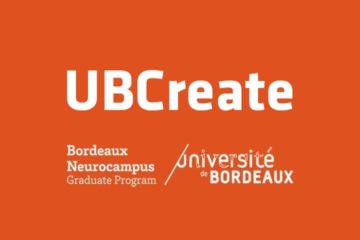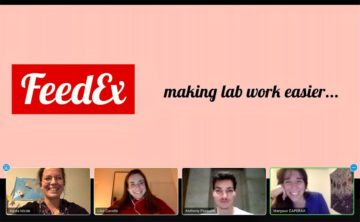
“Entrepreneurship Week – UB create”: Neuroscience laureates of the best pitch
 Last week was organized the 2nd edition of the “Entrepreneurship Week – UB create”, a hands-on training for Master and PhD students curious about the entrepreneurship path. During this training, students discovered the entrepreneurial challenge of conceptualizing a business models and pitching it to a jury, under the supervision of experts. The team giving the best presentation was awarded a prize. They also got the opportunity to meet and exchange with young entrepreneurs, who shared their visions and introduced some of the tools needed to develop an entrepreneurial mindset.
Last week was organized the 2nd edition of the “Entrepreneurship Week – UB create”, a hands-on training for Master and PhD students curious about the entrepreneurship path. During this training, students discovered the entrepreneurial challenge of conceptualizing a business models and pitching it to a jury, under the supervision of experts. The team giving the best presentation was awarded a prize. They also got the opportunity to meet and exchange with young entrepreneurs, who shared their visions and introduced some of the tools needed to develop an entrepreneurial mindset.
Congratulations to the laureates, The FeedEx team, composed of students from Bordeaux Neurocampus: Lise Cuvelle (Master 2), Margaux Caperaa (Master 2), Agata Idziak (PhD student at IINS) and Anthony Pasquon (Master 2).
 They were asked a few questions to telle about their experience and their moke business venture, FeedEx.
They were asked a few questions to telle about their experience and their moke business venture, FeedEx.
How did you get the idea? What was your source of inspiration?
Agata: It was a cold and rainy Saturday morning. I was supposed to go to the lab to change the medium in my brain slices and I started thinking: “Is there a way to do it from home?” I spent the day playing with different ideas and came up with FeedEx, which is a high-tech device allowing for remote medium exchange in biological samples.
Any plans to continue as an entrepreneur in the future?
Agata: To be honest, I have never seen myself as an entrepreneur. I always thought that I don’t have enough courage, determination and knowledge for it. However, this course not only taught me a lot about the mysterious world of business but also showed me that research career might not be the only option for my future.
Anthony: In the future, if I am convinced by a project, and depending on the opportunities available to me, I am not against the idea of continuing in this direction.
Margaux: For the moment, my goal is to pursue my Master’s degree and obtain funding for a PhD. However, we don’t know what the future holds, and I’m not closing any doors regarding entrepreneurship.
Lise: For the moment I don’t have any plans for the future, but we said that if it is really a good idea (not just for the game of the entrepreneurship week), it would be great to do it in real life.
What was the drive to register for this course?
Agata: This course was recommended to me by a colleague who has participated in it last year. I thought it would be a great idea to broaden my opportunities for my future career.
Anthony: I have always been drawn to the world of entrepreneurship. Sometimes with friends we imagine ourselves launching our own business. However, I knew almost nothing about the entrepreneurial profession. This teaching unit was an opportunity to find out more about this universe. I find it interesting to diversify and develop new skills. We don’t know what the future will hold.
Margaux: I have already had experience close enough to entrepreneurship in bachelor’s degree, and I wanted to try it again. So I chose this course to deepen my knowledge in this area and to see something other than courses associated with the field of research.
Lise: I registered for this course because I wanted to learn different topics that we are not used to when studying a master’s degree in neuroscience. It was a great opportunity to learn about financial aspects, business etc . It also gave me the occasion to have a first taste of what I could do after my studies if not Research.
What is the general feedback from this week?
Agata: Even though this workshop was pretty intense and packed and I am still processing everything I have learned, it was definitely a great experience for me. It was unfortunate that this workshop happened via Zoom, so there were fewer opportunities to network with everybody.
Anthony: This week was very intense due to the time allotted, but a very enriching experience for me. This teaching unit allowed me to develop knowledge on the basic principles of entrepreneurship (with the GRP model). I found it really interesting to discuss and receive advice from seasoned entrepreneurs as well as young entrepreneurs who launched their companies only a few years ago, drawing on their own experiences.
Margaux: During this week, we had to put into practice and manipulate theoretical notions seen during this semester that were for the most part quite strangers to us and very different from the scientific world in which we are immersed. It was quite complex to learn how to use these notions, but in the end it was very fulfilling. The intervention and discussion sessions with entrepreneurs were also very interesting. As Agata mentioned, it’s a real regret that this week couldn’t have been face-to-face, it would have made the experience all the more enriching. However, we can largely thank the organizers of this teaching unit!
Lise: I could say that this week was pretty intense and exhausting but really rewarding. Considering the sanitary problems, it was very well organized, even remotely. I also liked the fact that we could discuss with real consultants, people who had their own start-ups, people from incubator etc … So it was great for networking
What is your main take home message?
Agata: My take home message from this course is that to become a successful entrepreneur you not only need determination and loads of motivation, but also a specific set of knowledge. And only hard work, rich network and excellent teamwork skills can get you there.
Anthony: I think the most important thing is not to limit your creativity at first in order to find a really innovative business idea. Then, you have to work hard to make this project credible from a budgetary point of view in order to reassure potential investors, and by clearly identifying the target market as well as the different sources of income.
Margaux: Personally, my main take home message from this week is that teamwork is indispensable and is a major asset for this type of adventure. Having a hardworking mindset is also required to set up and perpetuate one’s business.
Lise: I think my take home message is that this course is for highly motivated students, because you shouldn’t count your hours during the week, but it is a great opportunity to open your mind to different topics, meet new people and see all the great work that you can achieve in less than 3 days.
What was the main challenge you encountered?
Agata: For me the main challenge was getting the business plan ready (especially the financial part!) under 3 days. Not only did I not understand half of the terms used in business plans, but I also had to use them for our idea. For instance, estimating how much we would need to spend on R&D in the first year of the company is really hard!
Anthony: I think the main challenge was to achieve our business plan and to prepare our pitch in a very short time (2 days). However, I found it very satisfying to see that with good group cohesion and perseverance we have succeeded in delivering quality work.
Margaux: I think that the main challenge of this week was to become (or at least get into the skin of) a real entrepreneur, which implied knowing how to use the right vocabulary, often very specific, and being able to set up a financial forecast over a few years (spoiler alert, this one was particularly … absorbing let’s say!).
Lise: the main challenge for me was for sure the financial part of the project as I don’t know anything about finance, it was hard to estimate the costs of everything in the project.
Source
https://neurocampus-graduateprogram.u-bordeaux.fr
Last update 21/01/21
